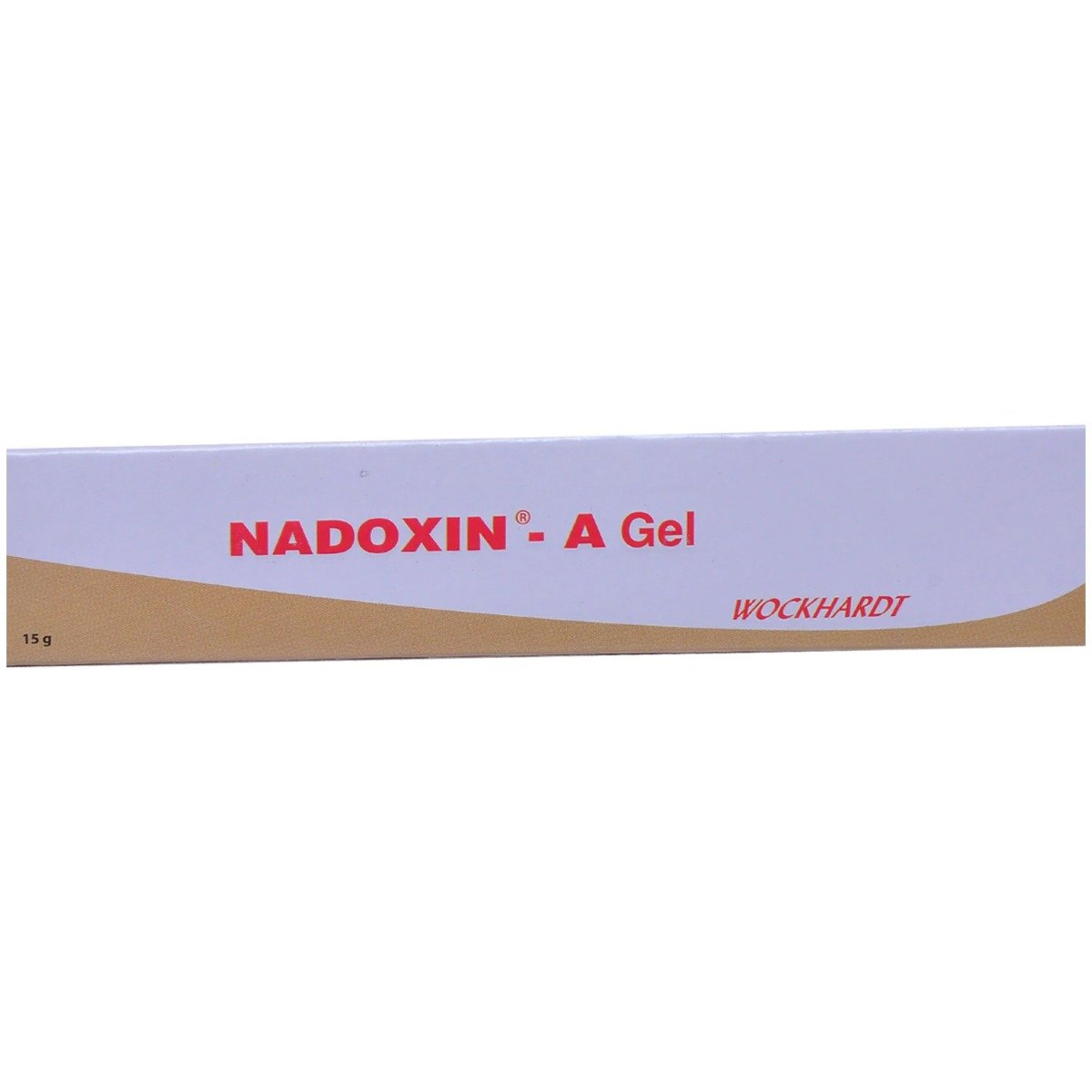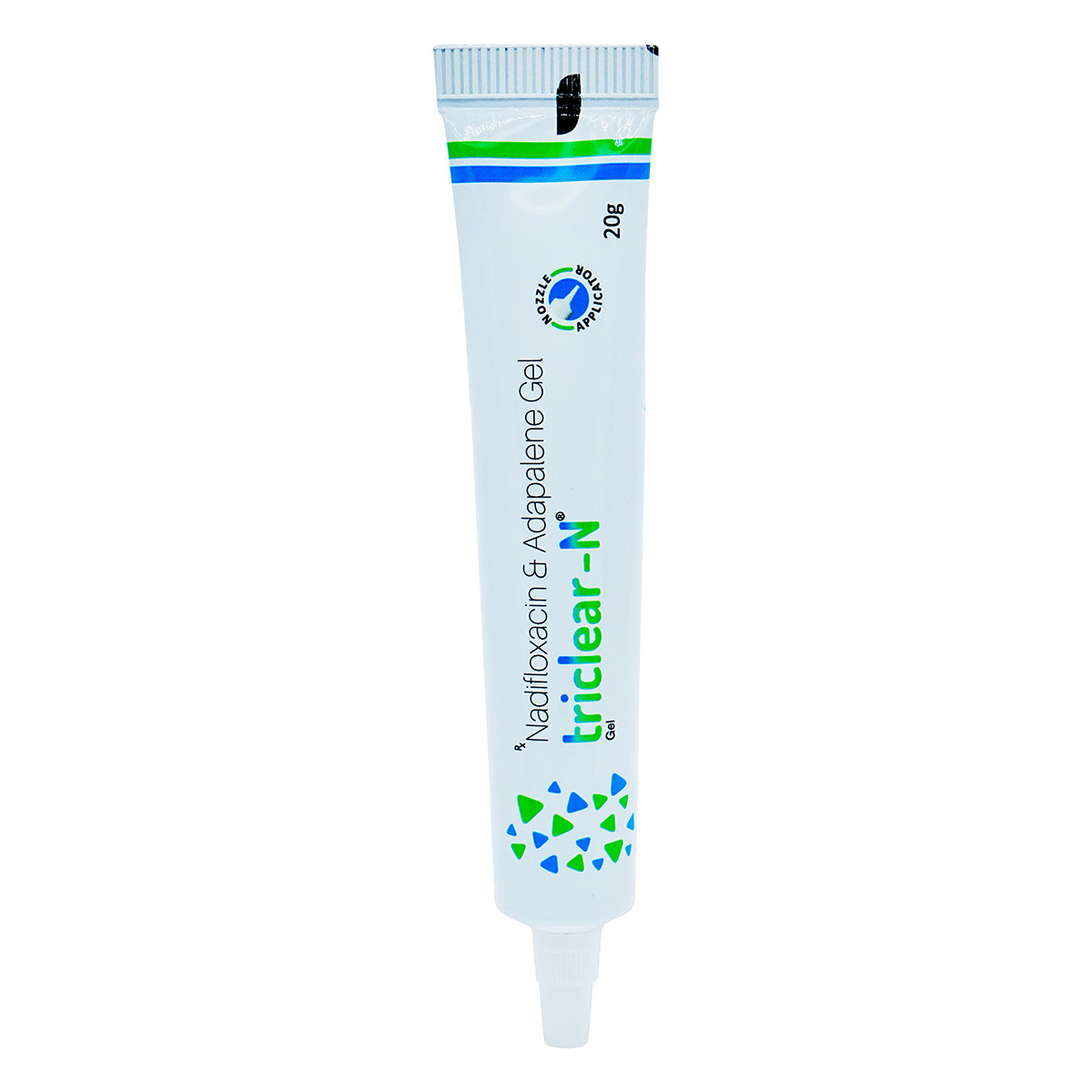Nadifloxacin+adapalene
About Nadifloxacin+adapalene
Nadifloxacin+adapalene belongs to the class of dermatological preparations called 'antiacne' used to treat acne (pimples). Acne is a common skin condition that occurs when hair follicles are blocked with dead skin cells and oil. The acne-causing bacteria feeds on sebum (natural oil produced by skin) causing redness and swelling.
Nadifloxacin+adapalene is a combination of two medicines: Adapalene (human-made vitamin A) and Nadifloxacin (antibiotic). Adapalene is a retinoid (human-made vitamin A) that works by loosening the cells on the skin’s surface and unblocks pores by reducing oil production in the skin. Nadifloxacin belongs to the class of antibiotics that works by inhibiting the production of essential proteins that are necessary for bacteria to grow, multiply and increase in numbers. It prevents the growth of acne-causing bacteria. Altogether, it stops or slows down the growth of bacteria and prevents the growth of acne.
Nadifloxacin+adapalene is only for external use. Take a small amount of Nadifloxacin+adapalene on the finger and apply as a thin layer on the clean and dry affected area. Avoid contact of Nadifloxacin+adapalene with nose, ears, mouth or eyes. In case Nadifloxacin+adapalene comes in contact with these areas accidentally, rinse with warm water thoroughly. Your doctor will advise you how often you take Nadifloxacin+adapalene based on your medical condition. In some cases, you may experience skin peeling, dry skin, irritation, redness, itching, or burning sensation at the site of application. Most of these side effects of Nadifloxacin+adapalene do not require medical attention and gradually resolve over time. However, if the side effects persist or worsen, please consult your doctor.
If you are known to be allergic to Nadifloxacin+adapalene or any other medicines, please tell your doctor. Do not apply Nadifloxacin+adapalene to cuts, open wounds, broken, sunburnt or sensitive skin areas. Avoid sun exposure while using Nadifloxacin+adapalene as it may make the skin more sensitive to sunlight and cause sunburn. Wear protective clothing and use sunscreen while going out to protect your skin from sunburn. If you are pregnant or breastfeeding, please inform your doctor before taking Nadifloxacin+adapalene. Do not apply Nadifloxacin+adapalene in large amounts or use for a long time than prescribed as it does not give quick or better results. Do not wax on the affected area as it may irritate the skin. Do not use other skin products while applying Nadifloxacin+adapalene. Do not give Nadifloxacin+adapalene to children below 12 years of age without consulting a doctor.
Uses of Nadifloxacin+adapalene
Medicinal Benefits
Nadifloxacin+adapalene is a combination of two drugs; namely, Adapalene and Nadifloxacin to treat acne (pimples). Adapalene is a retinoid (human-made vitamin A) that helps loosen the cells on the skin’s surface and unblocks pores by reducing the production of oil in the skin. It also helps increase the production of new skin cells, which aid in natural exfoliation (removal of dead skin cells) of the skin's outer layers. Nadifloxacin is a broad-spectrum antibiotic that acts against both aerobic (grow in the presence of oxygen) and anaerobic (grow in the absence of oxygen) gram-negative and gram-positive bacteria. Nadifloxacin works by inhibiting the production of essential proteins necessary for bacteria to grow, multiply and increase in numbers. Altogether, Nadifloxacin+adapalene stops or slows down bacteria's growth that causing acne and heals the skin by reducing swelling and redness.
Directions for Use
Storage
Side Effects of Nadifloxacin+adapalene
- Dry skin
- Itching
- Skin peeling
- Burning sensation at the site of application
Drug Warnings
If you are known to be allergic to Nadifloxacin+adapalene or any other medicines, please tell your doctor. Do not apply Nadifloxacin+adapalene to cuts, open wounds, broken, sunburnt, or sensitive skin areas. Avoid sun exposure while using Nadifloxacin+adapalene as it may make the skin more sensitive to sunlight and cause sunburn. Wear protective clothing and use sunscreen while going out to protect your skin from sunburn. If you are pregnant or breastfeeding, please inform your doctor before using Nadifloxacin+adapalene. Do not apply Nadifloxacin+adapalene in large amounts or use for a long time than prescribed as it does not give quick or better results but increases the risk of side effects such as redness, irritation, skin peeling, or discomfort. Inform your doctor about all your ongoing medications, skin products before using Nadifloxacin+adapalene.
Drug Interactions
Drug-Drug Interaction: Nadifloxacin+adapalene may interact with aminolevulinic acid topical, benzoyl peroxide topical, isotretinoin, methoxsalen, methyl aminolevulinate topical, porfimer, resorcinol topical, salicylic acid topical, sulfur topical, and verteporfin.
Drug- Food Interaction: No known interaction found/established.
Drug-Disease Interaction: If you have sunburn or eczema, please inform your doctor before using Nadifloxacin+adapalene.
Drug-Drug Interactions Checker List:
Safety Advice

Alcohol
cautionThe interaction of Nadifloxacin+adapalene with alcohol is unknown. Please consult a doctor before consuming alcohol while using Nadifloxacin+adapalene.

Pregnancy
cautionThe safety of Nadifloxacin+adapalene in pregnant women is unknown. Therefore, it is given to pregnant women only if the doctor thinks the benefits outweigh the risks.

Breast Feeding
cautionDo not apply Nadifloxacin+adapalene on the breast. You are advised to breastfeed only if the doctor thinks benefits are greater than risks.

Driving
safe if prescribedNadifloxacin+adapalene usually does not affect your ability to drive or operate machinery.

Liver
safe if prescribedIf you have any concerns regarding the use of Nadifloxacin+adapalene in patients with liver problems, please consult a doctor.

Kidney
safe if prescribedIf you have any concerns regarding the use of Nadifloxacin+adapalene in patients with kidney problems, please consult a doctor.

Children
unsafeNadifloxacin+adapalene is not recommended for children aged below 12 as the safety and effectiveness were not established.
Habit Forming
Diet & Lifestyle Advise
- Avoid sun exposure while using Nadifloxacin+adapalene as it may make the skin more sensitive to sunlight and cause sunburn. Try to wear protective clothing and use sunscreen while going out to protect your skin from sunburn.
- Regular exercise can improve your mood and self-esteem though it doesn’t clear acne. Take a shower immediately after finishing exercise as sweat may irritate acne.
- Do regular hair wash regularly and avoid hair falling across the face.
- Remove the make-up completely before going to bed.
- Avoid using products that may cause skin irritation such as harsh soaps, skin cleansers, shampoos, hair removers or waxes, hair colouring or permanent chemicals, detergents, and rough fabrics.
Special Advise
- You are advised to apply any other lotions, creams, or ointments including cosmetics and moisturizers after 30 minutes of applying Nadifloxacin+adapalene as using both simultaneously may reduce the effectiveness of Nadifloxacin+adapalene.
- Avoid contact of Nadifloxacin+adapalene with nose, mouth, eyes, or ears. In case Nadifloxacin+adapalene comes in contact with these areas accidentally, rinse with water.
- Do not squeeze, pop or pick spots as it may worsen them and cause permanent scarring.
Patients Concern
Disease/Condition Glossary
Acne (pimples): It is a common skin condition that occurs when hair follicles are blocked with dead skin cells and oil that causing pimples, whiteheads and blackheads. Acne affects people of all ages but is most common among teenagers. Acne symptoms include pus-filled pimples, uninflamed (not swollen) blackheads, red, large, and tender bumps. The treatment for acne includes certain creams, cleansers, and antibiotics.
FAQs
Yes, Nadifloxacin+adapalene may cause photosensitivity (increased skin sensitivity to sunlight) in the treated areas. Therefore, avoid or limit exposure to sunlight and sunlamps. You are advised to use a sunscreen and wear protective clothing while going out to prevent sunburn.
No, Nadifloxacin+adapalene is not recommended for eczema (itchy, cracked, swollen or rough skin) patients as it may increase the risk of severe irritation. Therefore, if you are suffering from eczema, inform your doctor before using Nadifloxacin+adapalene.
Yes, Nadifloxacin+adapalene may cause skin irritation or sensitivity as a side effect. However, if the irritation persists or worsens, stop using Nadifloxacin+adapalene and consult a doctor.
You are advised to use other acne products with Nadifloxacin+adapalene cautiously as some products may increase side effects. It is recommended to use Nadifloxacin+adapalene at night and other products in the morning. However, please consult a doctor before using any other medicines or skin products with Nadifloxacin+adapalene.
Yes, Nadifloxacin+adapalene may cause dryness of the skin. You can use a moisturizer while using Nadifloxacin+adapalene to prevent dry skin. However, do not apply Nadifloxacin+adapalene and moisturizer simultaneously as it may reduce the effectiveness of Nadifloxacin+adapalene. Please consult a doctor before using other products with Nadifloxacin+adapalene.
No, you are not recommended to stop taking Nadifloxacin+adapalene without consulting your doctor as it may worsen the condition or cause recurring symptoms. Therefore, take Nadifloxacin+adapalene for as long as your doctor has prescribed it, and if you experience any difficulty while taking Nadifloxacin+adapalene, please consult your doctor.
Nadifloxacin+adapalene is a combination of two medicines: Adapalene (human-made vitamin A) and Nadifloxacin (antibiotic). Adapalene is a retinoid (human-made vitamin A) that works by loosening the cells on the skin’s surface and unblocks pores by reducing oil production in the skin. Nadifloxacin belongs to the class of antibiotics that works by inhibiting the production of essential proteins that are necessary for bacteria to grow, multiply and increase in numbers. It prevents the growth of acne-causing bacteria. Altogether, it stops or slows down the growth of bacteria and prevents the growth of acne.





